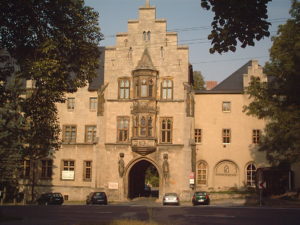against the Cross, 3
When one delves deeply into Nietzsche’s biography, curious anecdotes come to light that would be hard to imagine for those who are only familiar with his late writings.
Much has been said, for example, about the friendship between Richard Wagner and Nietzsche. But few know that Wagner was born in 1813: the year Nietzsche’s father was born. When Nietzsche was a little boy playing with his sister Elisabeth with tin soldiers and the porcelain figure ‘Squirrel King’ was executing rebels, the revolutionary Wagner was in serious trouble with the king and his life was spared because he was a conductor. The still-small Nietzsche was on the side of the rulers in his Christian kingdom. There were to be no revolutions.
When Nietzsche would later write about his life, he didn’t remember his home in Röcken except for the image of the parish priest, the father, whom he continued to idealise even after he had finished The Antichrist. Indeed, since his father had died when Nietzsche was four years old, the memories of Prussian discipline the priest had meted out to him, in which the little boy would furiously retreat to the toilet to rage alone, were left out of his memory (his mother would later tell some anecdotes about her young son’s life). The idealisation of the parish priest was such that, in the words of Werner Ross, ‘Nietzsche was to merge with his father to form a single figure with him’.
In the family it was taken for granted that little Fritz would become a clergyman like his father. His mother, who put him to bed, told him: ‘If you go on like this, I’ll have to carry you to bed in my arms until you study theology’. Fritz was an obedient child who knew several Bible passages and religious songs by heart so that his schoolmates called him ‘the little shepherd’, who was impressed above all by religious music.
But since the pietistic oppression was a thorn his body began to rebel. In 1856, when Fritz was already a dozen years old, he began to suffer from head and eye ailments. Although he received special holidays for this reason, from that age he would always suffer from these psychosomatic complaints (which would only be alleviated thirty-two years later, with the catharsis of writing several books in a few months, including The Antichrist).
The young Fritz would sneak into the cathedral to watch the rehearsals of the Requiem and was shocked to hear the Dies Irae. At the age of fourteen he entered the famous school in Pforta, where he received an excellent humanistic education and his love of music increased, although he continued to suffer from severe headaches.

At Schulpforta he even attempted a Mass for solo, choir and orchestra, and at the age of sixteen, he sketched a Misere for five voices. At seventeen the parson’s son was ready to die to meet Jesus, and when another of his friends trained in Prussian education (broken in like a horse I’d better say!) received the conformation, he wrote: ‘with the earnest promise you enter the line of adult Christians who are held worthy of our Saviour’s most precious legacy’.
Nevertheless, the first signs of rebellion, albeit still unconsciously, began to spontaneously sprout in his seventeenth year. In the Easter holidays of 1862, the student Nietzsche wrote to the union of his friends, under the title Fate and History, a prophetic declaration: ‘But, as soon as it would be possible to overthrow the entire past of the world with a strong will, we would enter the roll of the independent Gods’.
Schulpforta’s severe discipline had been a kind of convent to train not only Nietzsche but also the rest of the inmates, but the adolescent Nietzsche, always at the head of the class and lacking an esprit de corps, was such a good boy that in cases of insubordination he sided with the teachers.
In his thick volume (866 pages in the edition I have) Ross comments that the letters of the pupil Nietzsche are empty of content, in the sense that his inner life was still hermetically sealed off from him. Nevertheless, when the lad Nietzsche left Schulpforta on 7 September 1864, close to his twentieth birthday, and the following month went to study theology and classical philology at the University of Bonn, thanks to his Prussian education he already had the resources for a premature doctorate.